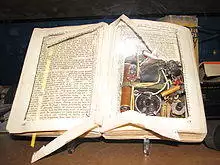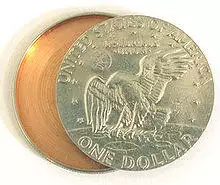conceal
[Origin: conceler, from Latin concelare, from com- + celare 'to hide']
Concealment devices or diversion [转移注意力] safes [保险柜] are used to hide things for the purpose of secrecy or security. They are made from an ordinary household object such as a book, a soda can, a candle, a can, or something as small as a coin. The idea is that such an inconspicuous object would not be expected to contain anything of worth.
Examples in espionage include dead drop spikes for transferring items to other people, and hollowed-out coins or hollowed out teeth for concealing something - such as microfilm or a suicide pill. Examples in smuggling include suitcases with false bottoms for hiding contraband [违禁品]. contra-和counter-都是against, opposite to的意思。
A dead drop or dead letter box is a method of espionage tradecraft used to pass items or information between two individuals (e.g., a case officer and an agent, or two agents) using a secret location. By avoiding direct meetings, individuals can maintain operational security. This method stands in contrast to the live drop, so-called because two persons meet to exchange items or information.
Tradecraft is the skills learned from experience in a trade, often used to refer to the skills spies use to avoid being detected. trade(交换)+craft(手艺)。
During World War II MI9 was responsible for creating many concealment devices for "escape aids" to assist prisoners of war to escape.
MI9, the British Directorate of Military Intelligence [情报] Section [部门] 9, was a highly-secret department of the War Office between 1939 and 1945. During World War II it had two principal tasks: (1) assisting in the escape of allied prisoners of war (POWs) held by the Axis countries, especially Nazi Germany; and (2) helping allied military personnel, especially downed airmen, evade capture after they were shot down or trapped behind enemy lines in Axis-occupied countries. A directorate is a part of a government department which is responsible for one particular thing. CIA is the abbreviation of Central Intelligence Agency.
Computer equipment and consumer electronics can easily be used for concealing goods and information. Usually the only tool required is a screwdriver, the device can be opened up, have the majority of the electronic and mechanical components removed and replaced with the goods to be concealed. Some of the more common devices used for this purpose are video players such as VHS, CD, DVD and Blu-ray players, computer accessories such as DVD-ROM drives and hard disk drives, battery packs or even a laptop computer itself. More often than not, the majority of the components will be removed to allow more space to conceal an item, but that will render the device inoperable and may arouse suspicion, and it may be of more benefit to preserve the operation of the device at the sacrifice of space. Additionally, the electronic device itself may be subject to theft, thereby defeating the purpose of such a concealment device. In other cases, items may be stored in parts of the machine without having to render it unusable - free space in the form of caddies that would normally be occupied by secondary and tertiary hard drives or disk drives can be large enough to store small items such as money and other valuables.
六级/考研单词: divert, soda, hollow, conceal, suicide, smuggle, seldom, spy, detect, militant, intellect, headmaster, axis, evade, shot, trap, abbreviation, compute, equip, consume, electron, component, accessory, parcel, laptop, render, arouse, suspicion, sacrifice, thief, thereby, norm, tertiary





 浙公网安备 33010602011771号
浙公网安备 33010602011771号